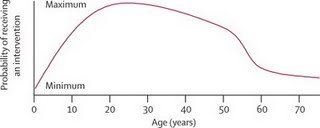
A lot of what Dr. Emanuel has had to say has been taken out of context. But it nevertheless true that he has tried to tackle the complex ethics of health care rationing, and he has proposed a system that favors some people (younger people in whom society has made an investment) over infants and seniors.
What do Latter-day Saints think of this prescription?
The first point that bears discussion is that health care rationing already exists. Medical professionals have limited resources. They make judgments on who to treat and how to treat them every day — in emergency rooms, during organ transplants, during pandemics. I am not a doctor, but it seems pretty clear that they would be guided by their own ethics during such decisions. Is Dr. Emanuel wrong to try to set up a structure by which to make such decisions?
Hypothetical: you are a doctor in a small town, and you have a pandemic, a super swine flu, if you will. There are 20 patients with the flu, but you only have 10 vaccines. How do you decide which one deserves the vaccine? Should the 90-year-old get it over the three-year-old? How about the 70-year-old mayor of the town — is he more deserving than the 15-year-old young woman?
Because Dr. Emanuel has significant influence, it is not a stretch to believe that such ideas could at some point become part of national policy. It is incontrovertible that rationing on a national scale is part of everyday life in Britain and Canada, for example, which have public national health systems. It is also incontrovertible that Pres. Obama has said he eventually wants a single-payer system like Canada. So, it is completely logical to assume that we should consider what that system would look like, whether rationing would take place and how rationing would be decided. Dr. Emanuel’s scheme may be the type of system — among many others — that is considered on a national scale.
What makes many people uncomfortable — including myself — is the idea of the government being involved in these decisions. Anybody who has gone to a crowded post office or faced an IRS audit or gone to a crowded DMV office in Miami (where the wait for a driver’s license is — I kid you not — eight hours) should be in a complete panic about government workers determining your fate. The Wall Street Journal has imagined the Orwellian future of death panels, and it sounds horrifying.
And it is worth pointing out that the Washington Post has considered the current House bill and has found some truth to the claim that end-of-life counseling would overstep appropriate bounds by involving the government in such decisions.
But, to be fair, Dr. Emanuel is not proposing death panels, nor is President Obama. But the Democrats, by including these issues in a national health care bill, are treading on areas where it is probably best for the government to be involved as little as possible. I think people are not likely to get up in arms about an individual doctor, in an emergency decision, deciding to treat little Janey rather than the 90-year-old. But people are extremely concerned about such a decision being made by faceless bureaucrats on a national scale.
I would like to address one other misunderstanding about rationing. You will often hear the claim that we already have rationing based on the ability to pay. Such a claim is nonsensical in a free-market system. This is like saying that there is rationing of million-dollar houses because not everybody lives in one.
Yes, it is true that the rich can get better medical care than the poor. It is also true that the rich usually drive better cars and get more trips to the Virgin Islands. The rich usually have better medical care because they either A)have better health insurance plans through their employers or B)see better, more qualified doctors and pay for it themselves. Have we really reached the point where we are so covetous that we will begrudge people to spend their own money the way that they want, claiming that unless everybody gets to see the best doctors we are suffering from “rationing?”
And given that there is a limited supply of the “best doctors,” how else are we going to determine who gets access to them? Some of these doctors will obviously choose to donate their time to the needy, but a government that insists by fiat that it is “more fair” to control a doctor’s time based on some arcane formula of “need” is a government that is interfering in personal freedom in ways that I consider unsustainable.
Here is an inconvenient truth for those concerned with “fairness” in access to medical care: many doctors (not all) choose to go to medical school for six, eight, 10 years because they expect to be well-paid. They have very large medical school bills to pay off and very large malpractice insurance bills to face, thanks to trial lawyers. The moment you begin telling doctors that they must spend their time seeing only poor clients is the moment a lot less people decide to go to medical school. And then you have an even bigger scarcity problem: not enough doctors.
So, it seems that, even in the medical field, it all comes back to supply and demand. And, indeed, that is what rationing is all about: supply not meeting demand. Any solution to our health care problems must consider the issues of supply and demand or it will fail. We should be talking a lot more about how to increase the supply of doctors, increase the supply of health insurance (through tax credits to individual who buy health insurance, for example), and increase medical innovation rather than measures that will inevitably involve more bureaucracy. Then, we could get away from the admittedly overwrought talk about “death panels” and have more civil town hall discussions.